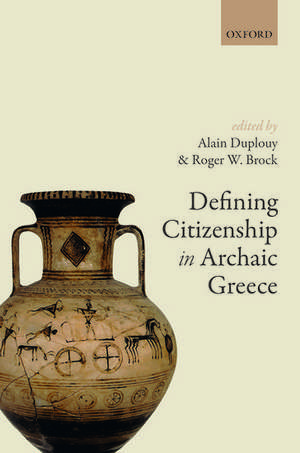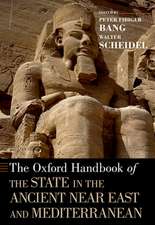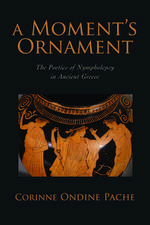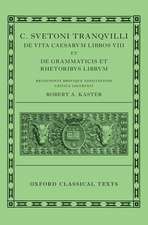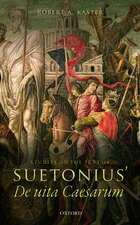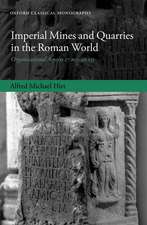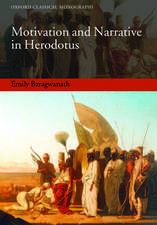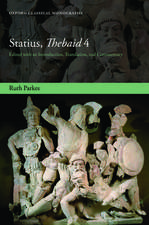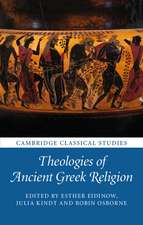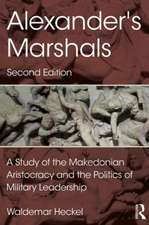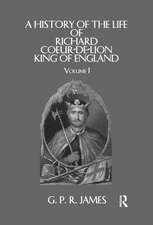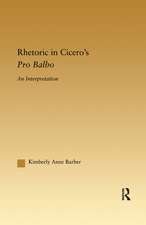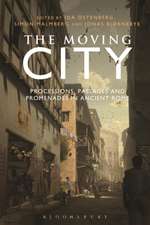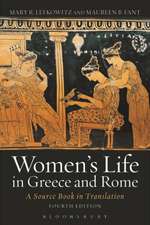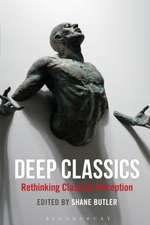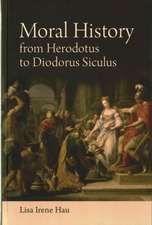Defining Citizenship in Archaic Greece
Editat de Alain Duplouy, Roger W. Brocken Limba Engleză Hardback – 22 mar 2018
Preț: 704.33 lei
Preț vechi: 1009.09 lei
-30% Nou
Puncte Express: 1056
Preț estimativ în valută:
134.77€ • 146.86$ • 113.57£
134.77€ • 146.86$ • 113.57£
Carte tipărită la comandă
Livrare economică 12-18 aprilie
Preluare comenzi: 021 569.72.76
Specificații
ISBN-13: 9780198817192
ISBN-10: 0198817193
Pagini: 386
Ilustrații: 5 black-and-white illustrations
Dimensiuni: 165 x 241 x 30 mm
Greutate: 0.72 kg
Editura: OUP OXFORD
Colecția OUP Oxford
Locul publicării:Oxford, United Kingdom
ISBN-10: 0198817193
Pagini: 386
Ilustrații: 5 black-and-white illustrations
Dimensiuni: 165 x 241 x 30 mm
Greutate: 0.72 kg
Editura: OUP OXFORD
Colecția OUP Oxford
Locul publicării:Oxford, United Kingdom
Recenzii
...each chapter is a tantalizing amuse bouche for each scholar's other works. Taken altogether, the volume represents a snapshot of the variety of archaic citizenships and the methods for uncovering them.
Duplouy's and Brock's thought-provoking revisitation of traditional methodology will therefore be essential to any future study of Greek citizenship.
This thought-provoking volume is different. Exploring a range of perspectives, it provides a route into considering Archaic communities through their processes, groupings, activities and identities, making it a valuable, and varied, contribution to the field.
[A] well-produced book that both displays exemplary internal coherence and brings together many of the foremost scholars working on Archaic citizenship . . . The book is filled with brilliant insights and promising methodological pathways that should inform future scholarship.
Readers of this volume are well advised to start with B.'s 'Conclusion' to the volume. From that they will learn that the volume is not really about 'citizenship', as a juridically defined status, at all. Rather it is about the variety of modes of 'community participation' within the archaic Greek world. Presumably we owe the title partly to the book's origins in two conferences on archaic Greek citizenship, partly to the way in which, in the opening words of D.'s first chapter, 'Citizenship is a major feature of contemporary national and international politics'.
Duplouy's and Brock's thought-provoking revisitation of traditional methodology will therefore be essential to any future study of Greek citizenship.
This thought-provoking volume is different. Exploring a range of perspectives, it provides a route into considering Archaic communities through their processes, groupings, activities and identities, making it a valuable, and varied, contribution to the field.
[A] well-produced book that both displays exemplary internal coherence and brings together many of the foremost scholars working on Archaic citizenship . . . The book is filled with brilliant insights and promising methodological pathways that should inform future scholarship.
Readers of this volume are well advised to start with B.'s 'Conclusion' to the volume. From that they will learn that the volume is not really about 'citizenship', as a juridically defined status, at all. Rather it is about the variety of modes of 'community participation' within the archaic Greek world. Presumably we owe the title partly to the book's origins in two conferences on archaic Greek citizenship, partly to the way in which, in the opening words of D.'s first chapter, 'Citizenship is a major feature of contemporary national and international politics'.
Notă biografică
Alain Duplouy is Reader in Greek Archaeology at the Université Paris 1 Panthéon-Sorbonne, where he has been teaching since 2003. He studied Classics in Brussels and Archaeology in Paris, and was previously a British Academy Visiting Fellow at Leeds and a Fulbright Scholar at the University of California, Los Angeles. He has been involved in and also co-directed various field projects in Greece (Itanos) and Italy (Laos and Pietragalla), and his research interests focus particularly on the archaic Greek world, the archaeology of ancient Lucania, and the history of university collections. His publications mainly cover the social and political history of archaic Greece, with a focus on the elite and on citizenship.Roger W. Brock is Senior Lecturer in Classics at the University of Leeds. He studied at Oxford, was a Postdoctoral Fellow at the Ohio State University, and taught at the University of St Andrews and Balliol College, Oxford, before moving to Leeds in 1990. His research interests lie particularly in the fields of Greek historiography, especially Herodotus, and ancient Greek politics, while his publications cover Greek political and constitutional organization, political imagery and ideology, and also wider topics in Greek history and literature. His research currently focuses on ancient Greek citizenship, especially civic subdivisions and non-political aspects, and the related topic of the functioning of Greek oligarchies; he also has a long-standing interest in wine in ancient Greece.
